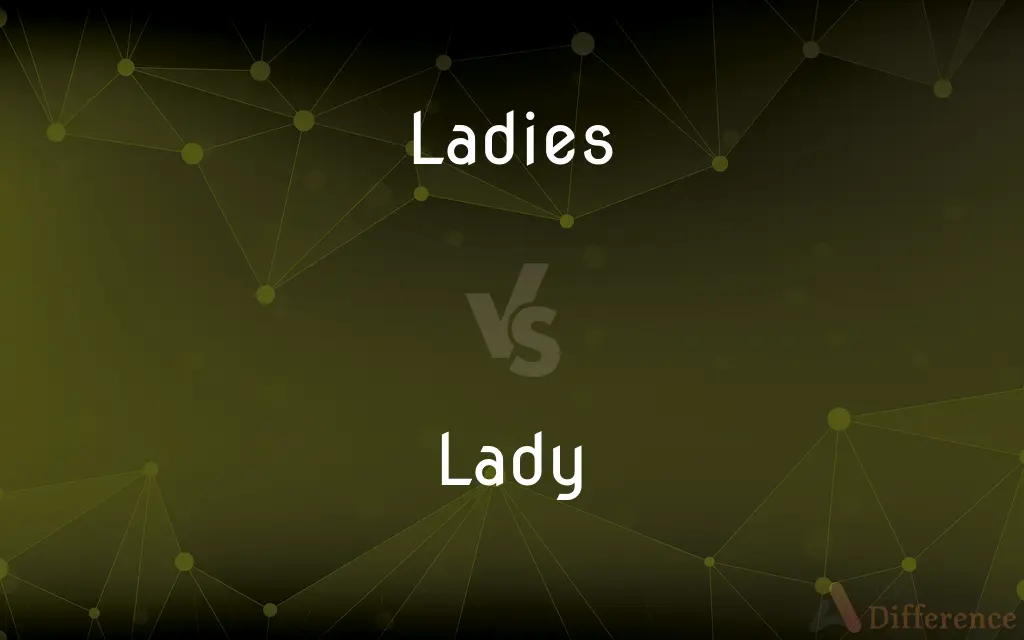Ladies vs. Lady — What's the Difference?
By Fiza Rafique & Maham Liaqat — Updated on April 3, 2024
"Ladies" is the plural form of "lady," referring to multiple women with respect or formal address, while "lady" denotes a single woman, often used with titles or as a sign of respect.

Difference Between Ladies and Lady
Table of Contents
ADVERTISEMENT
Key Differences
A "lady" is a term used to refer to a single woman, often with an emphasis on dignity, respect, or social standing. This term can be used both in a general sense, referring to any woman, and in a more specific sense, to denote a woman of high social rank or exemplary manners. On the other hand, "ladies" is simply the plural form of "lady," used when referring to more than one woman. The transition from singular to plural does not alter the fundamental connotation of respect and social standing, but it does adjust the scope of address from an individual to a group.
When used in titles, "lady" is often capitalized and followed by a surname or title, signifying formal recognition or status within certain social or honorific systems. Whereas "ladies" can be used in similar contexts but is tailored for addressing or referring to multiple women who meet the criteria for being called "lady," such as in formal announcements or event invitations.
In casual contexts, "lady" can be a polite way to refer to a woman whose name is unknown. Conversely, "ladies" is used to address or refer to a group of women in a courteous manner, such as when entering a room and greeting with "Good evening, ladies."
"Lady" is also used in various idiomatic expressions and titles, often to denote a particular role or characteristic, such as "lady of the house" or "leading lady" in theatrical productions. "Ladies," on the other hand, finds its use in collective references that emphasize the participation or inclusion of multiple women, like "ladies' night" at a bar or "ladies' singles" in tennis.
The use of "lady" versus "ladies" is context-dependent, with the singular form focusing on the individual and the plural on the collective. This distinction is crucial in formal writing and speech, where precision in addressing or referring to women respectfully is paramount.
ADVERTISEMENT
Comparison Chart
Number
Singular
Plural
Usage
Refers to a single woman
Refers to multiple women
Context
Can be specific (with titles) or general
Used in both specific and general contexts
Formality
High, especially with titles or honorifics
Maintains formality when addressing groups
Expressions
Found in idiomatic expressions and roles
Used in collective references and event names
Compare with Definitions
Ladies
Used in formal group addresses.
The event is open to all ladies interested.
Lady
A term of respect for a woman.
The lady in the red dress captivated everyone's attention.
Ladies
Refers to women participants in events.
The ladies' singles finals are tomorrow.
Lady
Used with titles, denoting social rank.
Lady Hamilton will be attending the dinner.
Ladies
Polite reference to multiple women in general.
The ladies at the meeting agreed on the proposal.
Lady
Refers to a woman of manners or distinction.
She is recognized as a true lady in her community.
Ladies
Plural form of lady, used for groups of women.
Ladies, your attention, please.
Lady
Can denote the female counterpart in a relationship.
She's the lady of the house.
Ladies
Used in titles of women-specific events or promotions.
Ladies' night at the club offers free entry.
Lady
Utilized in specific roles or titles.
She was the leading lady in the play.
Ladies
A woman of high social standing or refinement, especially when viewed as dignified or well-mannered.
Lady
A woman of high social standing or refinement, especially when viewed as dignified or well-mannered.
Ladies
A woman who is the head of a household
Is the lady of the house at home?.
Lady
A woman who is the head of a household
Is the lady of the house at home?.
Ladies
A woman, especially when spoken of or to in a polite way
Ladies, may I show you to your table?.
Lady
A woman, especially when spoken of or to in a polite way
Ladies, may I show you to your table?.
Ladies
Used as a form of address for a woman, often with sarcasm or irritation
Look, lady, I was ahead of you in line.
Lady
Used as a form of address for a woman, often with sarcasm or irritation
Look, lady, I was ahead of you in line.
Ladies
A woman who is the object of romantic or chivalrous love
A knight serving his lady.
Lady
A woman who is the object of romantic or chivalrous love
A knight serving his lady.
Ladies
(Informal) A wife or girlfriend
A man kissing his lady at the airport.
Lady
(Informal) A wife or girlfriend
A man kissing his lady at the airport.
Ladies
A lady in waiting
The queen and her ladies.
Lady
A lady in waiting
The queen and her ladies.
Ladies
A general feminine title of nobility and other rank, specifically as the title for the wife or widow of a knight or baronet.
Lady
A general feminine title of nobility and other rank, specifically as the title for the wife or widow of a knight or baronet.
Ladies
Used as a form of address for a woman of high rank, especially for a marchioness, countess, viscountess, baroness, or baronetess.
Lady
Used as a form of address for a woman of high rank, especially for a marchioness, countess, viscountess, baroness, or baronetess.
Ladies
Lady The Virgin Mary. Usually used with Our.
Lady
Lady The Virgin Mary. Usually used with Our.
Ladies
Plural of lady
Lady
(historical) The mistress of a household.
Ladies
(obsolete) lady
Lady
A woman of breeding or higher class, a woman of authority.
"I would like the dining room to be fully set by tonight; would you do so?" "Yes, my lady".
Ladies
A ladies' room: a lavatory intended for use by women.
Pardon me, I need to visit the ladies.
Lady
The feminine of lord.
Lady
A title for someone married to a lord or gentleman.
Lady
A title that can be used instead of the formal terms of marchioness, countess, viscountess, or baroness.
Lady
(in the plural) A polite reference or form of address to women.
Ladies and gentlemen, it is a pleasure to be here today. Follow me, ladies!
Lady
(slang) Used to address a female.
Hey, lady, move your car!
Hey, ladies, how are you doing?
Lady
(ladies' or ladies) Toilets intended for use by women.
Lady
(informal) A wife or girlfriend; a sweetheart.
Lady
A woman to whom the particular homage of a knight was paid; a woman to whom one is devoted or bound.
Lady
(slang) A queen the playing card.
Lady
Who is a woman.
A lady doctor.
Lady
(Wicca) Lady.
Lady
(archaic) gastric mill, the triturating apparatus in the stomach of a lobster, consisting of calcareous plates; so called from a fancied resemblance to a seated female figure.
Lady
A five-pound note. (Rhyming slang, Lady Godiva for fiver.)
Lady
A queen.
Lady
To address as “lady”.
Lady
A woman who looks after the domestic affairs of a family; a mistress; the female head of a household.
Agar, the handmaiden of Sara, whence comest thou, and whither goest thou? The which answered, Fro the face of Sara my lady.
Lady
A woman having proprietary rights or authority; mistress; - a feminine correlative of lord.
Of all these bounds, even from this line to this, . . . We make thee lady.
Lady
A woman to whom the particular homage of a knight was paid; a woman to whom one is devoted or bound; a sweetheart.
The soldier here his wasted store supplies,And takes new valor from his lady's eyes.
Lady
A woman of social distinction or position. In England, a title prefixed to the name of any woman whose husband is not of lower rank than a baron, or whose father was a nobleman not lower than an earl. The wife of a baronet or knight has the title of Lady by courtesy, but not by right.
Lady
A woman of refined or gentle manners; a well-bred woman; - the feminine correlative of gentleman.
Lady
A wife; - not now in approved usage.
Lady
Any woman; as, a lounge for ladies; a cleaning lady; also used in combination; as, saleslady.
Lady
The triturating apparatus in the stomach of a lobster; - so called from a fancied resemblance to a seated female figure. It consists of calcareous plates.
Lady
Belonging or becoming to a lady; ladylike.
Lady
A polite name for any woman;
A nice lady at the library helped me
Lady
A woman of refinement;
A chauffeur opened the door of the limousine for the grand lady
Lady
A woman of the peerage in Britain
Common Curiosities
How do you use the term "ladies" correctly?
"Ladies" is used when addressing or referring to a group of women respectfully.
Do the terms "lady" and "ladies" imply a certain age?
No, these terms do not necessarily imply a specific age but are more about respect and social context.
Can men be referred to as "ladies"?
Traditionally, no. The terms are specifically gendered to women, though social contexts and usage can vary.
Can "lady" be used informally?
Yes, "lady" can be used informally to refer to any woman in a respectful manner.
Is it outdated to use "lady" or "ladies"?
Not necessarily; these terms are still used, especially in formal contexts or as a sign of respect.
Are "lady" and "ladies" synonymous with "woman" and "women"?
They can be, but "lady" and "ladies" often carry a higher degree of formality or respect.
Can "ladies" be used in professional settings?
Yes, but sensitivity to context and preference is important; some may find it too traditional or prefer "women."
Can "lady" be used in a derogatory way?
While generally respectful, context and tone can sometimes render "lady" derogatory, though this is less common.
What is a "ladies' man"?
A man who is popular and well-regarded by women, often due to his manners or charm.
Is "Lady" used as a title outside of the UK?
Yes, while associated with British nobility, "Lady" as a title is used in various cultures with similar respect.
What does it mean when someone is called a lady?
Being called a lady typically signifies respect, social standing, or polite reference to a woman.
How do titles like "Lady" impact social perception?
Titles like "Lady" can elevate someone's social standing or perception, indicating respect or a certain nobility.
How do you address a group of women politely?
Using "ladies" is a polite way to address a group of women.
What makes someone a "lady" in modern times?
Today, being a "lady" can signify dignity, respect, and proper manners, transcending traditional social ranks.
Are there modern equivalents to "lady" and "ladies"?
In some contexts, terms like "woman" or "women" are used, though "lady" and "ladies" still hold a place for formality.
Share Your Discovery

Previous Comparison
Uncompliant vs. Incompliant
Next Comparison
Nucleus vs. NucleiAuthor Spotlight
Written by
Fiza RafiqueFiza Rafique is a skilled content writer at AskDifference.com, where she meticulously refines and enhances written pieces. Drawing from her vast editorial expertise, Fiza ensures clarity, accuracy, and precision in every article. Passionate about language, she continually seeks to elevate the quality of content for readers worldwide.
Co-written by
Maham Liaqat













































